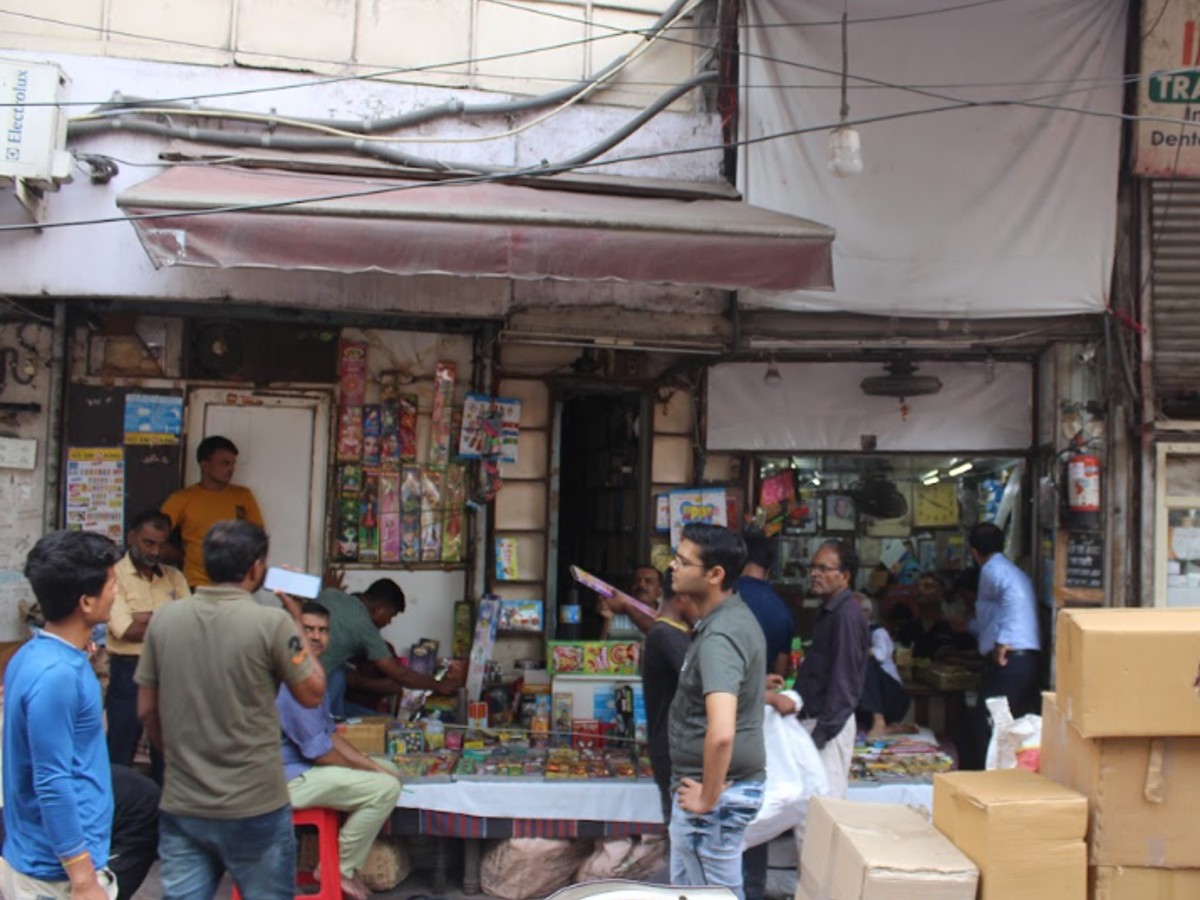
A street that once used to be filled with consumers now has very few of them. (Photo: Rohan Chauhan)
On 7 September, Environment Minister Gopal Rai stated, “To save the people of Delhi from the danger of pollution, like last year, a complete ban is being imposed on the production, storage, sale, and use of all types of firecrackers, so that people’s lives can be saved.”
He added that this year, there will also be a ban on the online sale of firecrackers in Delhi. This restriction will remain in force until 1 January 2023.
“An action plan will be drawn up with Delhi Police, DPCC, and the Revenue Department to strictly implement the ban”, Rai stated.
The statement has been criticised by several Delhiites, who question if Diwali is the only factor that affects the air quality of the city.
The restriction will affect sales and shopkeepers who rely on the business of firecrackers, especially during the festive season.
Patriot visited Chandni Chowk, known as one of the major markets for firecrackers, to understand the ground situation.
Recurring misery
Among the long line of stores selling firecrackers on the crowded streets of Chandni Chowk, only a few had a large number of customers.
Speaking about the impact of this decision on his business, a shopkeeper in his late sixties said, “Main to pareshan ho gaya hu (I am frustrated). Every year during festivities, we have to face this problem. We’ve gone to court, the Supreme Court too, but nothing seems to go in our favour. I’m a senior citizen. I have grandkids, and I don’t think I’ll be able to buy anything for them for the holidays, since there is no business. It’s 5.00 in the evening and I’ve been sitting idle all day.”
Lights out
The government has also banned green crackers this year though they are environment-friendly. They are made using alternative raw materials that reduce particle emission into the atmosphere by 30% as they suppress the dust produced. While regular crackers, on an average, emit around 160 decibels of sound, green crackers produce 110-125 decibels of sound.
The shopkeeper says, “We had stocked up on green crackers for Diwali and Chatt Puja, but now that they have been banned too, what are our options?” Such crackers have a shelf life of only 8-10 months
He adds, sarcastically, that the ban on crackers was imposed to safeguard the health of Delhi residents, yet providing free or low-cost alcohol is what makes them healthier and stronger.
Dismay all around
Another shopkeeper, Sumit Jain, said it isn’t only the shopkeepers who will be affected by this move. “There are a lot of people who are associated with the product. What about those who work on packaging, design and the 10 other professions involved in production? How are they going to celebrate festivals with no work?”
He adds that customers are now afraid to come and buy crackers from them fearing the police. “Usually, at this time of the evening in September, there is no space to set foot here. But take a look at the market right now. There are no customers. On the one hand, government officials talk about the country’s increasing unemployment, and on the other, they are taking away jobs of thousands of individuals”, Jain says.
Most shopkeepers don’t know how to dispose of the crackers he had stocked. “I can’t even sell them to a supplier in another city because shipping them is prohibited”, says Amit Singh, another shopkeeper.
He highlights that licenses for traders of firecrackers are still being renewed in order to make money. “If selling crackers is prohibited, how come licenses are being distributed?”, he questions.
Vendors upset
Several shopkeepers appear unconcerned by the ban on firecrackers, claiming that the administrative move is announced every year for the last five years, and that they are used to bearing losses as a result.
“There has been no formal clarification as of yet. We’ll close our businesses and depart legitimately on the day we receive a formal explanation”, says one of the vendors.
He continues, “At this point, there’s so much drama. That’s why we try to sell our stock in small quantities on different occasions so that we can cover up the losses. We had to lay off several employees because their labour wasn’t required anymore. What are they going to do? We have no idea. They might as well start chain snatching as most of them know only labour work and come from the backward rural areas of Uttar Pradesh.”
Rickshaw drivers, waiting in front of these shops in hope of a customer, say, “We used to get a lot of work from firecracker shops, because people used to come and shop frequently. But as the number of customers for these shops has decreased, our business has also suffered.”
Instagram: instagram.com/thepatriot_in/
Twitter: twitter.com/Patriot_Delhi
Facebook: facebook.com/Thepatriotnewsindia
AQI rises to 208, slipping into ‘poor’ category, according to the Central Pollution Control Board
Dilli 6 – Ishq-e-Dilli at Edesia presents a carefully sequenced journey through familiar flavours from…
Two youth arrested for killing a 55-year-old woman during a robbery in Jyoti Nagar; stolen…
Scheme aims to provide affordable meals to over 1 lakh people daily, with each canteen…
Featuring works by Krishen Khanna and Prabhakar Kolte, the exhibition explores Indian modernism through figurative…
Police are probing the stabbing death of a 36-year-old man found near Sanjay Lake in…